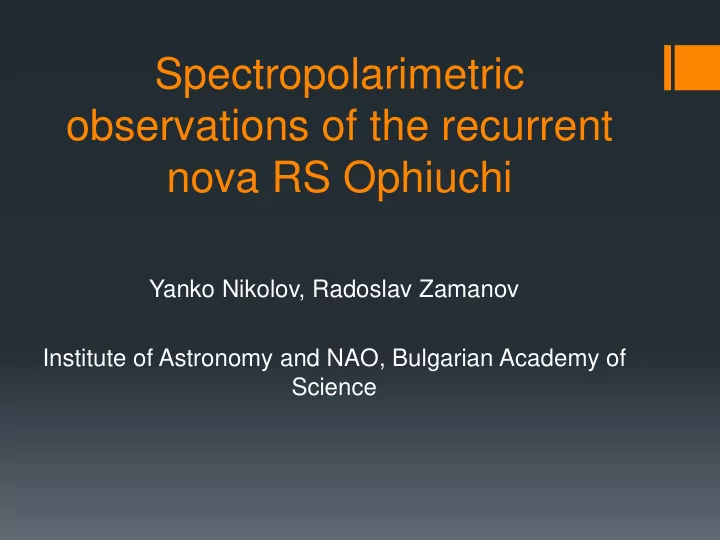

Spectropolarimetric observations of the recurrent nova RS Ophiuchi Yanko Nikolov, Radoslav Zamanov Institute of Astronomy and NAO, Bulgarian Academy of Science
Introduction RS Ophiuchi (HD162214) is a symbiotic binary system in wich a near Chandrasekhar-mass white draft acretes material from a M2 III red giant companion (Mikolajewska & Shara 2017) The orbital period of the binary is 453,6 days and the obrit inclination is 49 ° -52 ° (Brandi at al. 2009) RS Oph undergoes novae eruptions approximately every 20 years ( Schaefer 2010)
Observations Spectropolarimetric observations of RS Oph were secured with the 2-Channel- Focal-Reducer Rozhen (FoReRo2), attached at the Cassegrian focus of the 2.0m RCC telescope of the NAO Rozhen. We observed RS Oph ≈ 10 years after last recurrent nova outburst (Hirosawa et al. (2006)) We obtained polarized spectra of RS Oph and standard stars with high degree of polarization (HD204827 and HD161056) and zero degree of polarization (HD212311 and HD154892). Polarimetric standard stars were observed with the same instrumental setup as RS Oph. We used standard stars with zero degree of polarization to correct for the instrumental polarization We used standard stars with high degree of polarization to correct for the position angle Table 1 Journal of observations Object Data-obs UT Exp.time yyyy-mm-dd 2017-07-21 20:32:26 8*100 s RS Oph 2018-02-17 03:38:29 16*90 s 2018-03-11 03:13:19 8*60 s
Data Analysis
Results Standard stars with zero degree of polarization – the observed degree of polarization p% represents instrumental polarization Table 2 Catalogue value Ref. Turnshek, D.A. et al. 1990 Object V P(%) 0.028 ± 0.025 HD212311 8.10 0.05 ± 0.03 HD154892 8.0
Results Standard stars with high degree of polarization after correction for instrumental polarization Table 3 Catalogue value Ref. Turnshek, D.A. et al. 1990 and Schmidt, G.D. et al. 1992 Object V P % angle V 5.322 ± 0.08 V 58.73 ± 0.08 HD204827 7.93 R 4.893 ± 0.024 R 59.10 ± 0.17 V 4.030 ± 0.025 V 66.93 ± 0.18 HD161056 6.32 R 4.012 ± 0.032 R 67.33 ± 0.23
Results Spectropolarimetric observation of RS Oph – Degree of polarization
Results Spectropolarimetric observation of RS Oph – position angle
Discussion Position angle θ Table 4. Position angle θ θ note reference 46.6 °± 4.5 P.A. of nine field stars Cropper 1990 44.2 °± 1.4 P.A. of 488 day after outbursts Cropper 1990 78.7 °± 5.1 ? Somero et al. 2016 47.2 °± 0.5 This work Our value obtained for P.A. is similar in value to that obtained from Cropper (1990) and differs from that obtained from Somero et al. (2016)
Interstellar polarization Table 5 The results of the fit with Serkowski law P( λ 𝒏𝒃𝒚 )(%) λ 𝒏𝒃𝒚 ( Å) K Reference 2.60 1.15 5900 Cropper 1990 2.75 1.69 5867 Somero et al. 2016 2.83 1.91 5760 This work
Interstellar polarization toward RS Oph
Discussion “During its 1985 outburst, RS Oph developed intrinsic linear polarization with a position angle aligned with the radio jet structure seen in VLBI observation” Cropper 1990. The degree of intrinsic polarization of RS Oph, obtained by Cropper( 1990) are presented in table 4. Our results of degree of polarization of RS Oph represent interstellar polarization.
Conclusions Our result of spectropolarimetric observations of RS Oph most likely represented Stokes parameter Q and U of interstellar polarization. Our result is in argement with earlier observation by Cropper (1990) where they detected intrinsic polarization only during the outburst
Discussion Degree of linear polarization
Recommend
More recommend